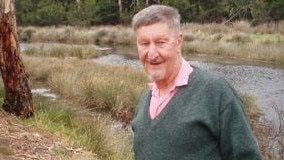Pioneering NT doctor remembered as ‘a living saint’ for work with remote Aboriginal leprosy patients
PIONEERING Territory doctor John Hargrave MBE AO has been remembered as a “living saint and icon of surgery” after he passed away in his adopted home of Hobart on Thursday
Northern Territory
Don't miss out on the headlines from Northern Territory. Followed categories will be added to My News.
PIONEERING Territory doctor John Hargrave MBE AO has been remembered as a “living saint and icon of surgery” after he passed away in his adopted home of Hobart on Thursday.
Dr Hargrave moved to Darwin from South Australia in 1956 where he dedicated himself to combating the scourge of leprosy in Top End Aboriginal communities and introduced Australia’s first reconstructive surgery program for leprosy patients.
MORE TOP NT NEWS
Queenslanders enjoy the Territory soil after Brisbane, Ipswich, Logan, taken off hot spots list
Boon for tourism as vouchers inject almost $7.1 million into economy
Police charge two men after alleged highway shooting incident, urge protesters to go home
National Critical Care and Trauma Response Centre executive director, Len Notaras — who was the chief executive of Royal Darwin Hospital during Dr Hargrave’s time in the NT — described him as “a true humanitarian, disinterested in recognition or reward”.
“If ever there was a living saint and icon of surgery, it was John,” Prof Notaras said.
“A reserved and unassuming man who epitomised humility and a genuine commitment to the Northern Territory and to Aboriginal Health.

“Almost single-handedly, as a pioneer in vascular and microsurgery, he worked selflessly to reverse procedures that had seen such interventions as sterilisation in young women.”
Dr Hargrave ran the East Arm Leprosarium before it’s closure in 1982 and only moved away from the Territory on his retirement in 2000.
During his time in the NT Dr Hargrave not only promoted Aboriginal health but formed many cherished friendships with his patients, including Jack Little, whose hand Dr Hargrave operated on in 1958 before Mr Little himself went on to specialise in leprosy care.
In the book Ordinary People, Extraordinary Lives, Mr Little is quoted as saying “If it wasn’t for Dr Hargrave, I would not know how to look after my own people”.
“I never saw a doctor doing such wonderful things to help Aboriginal people,” he said.
LIMITED TIME – Discounted NT News subscription offer: $1 a week
“Not only that, he can talk half a dozen languages, my language too.
“It opened up a way to see Aboriginal people working with government departments, and turned around attitudes to medication (and health).”
Dr Hargrave was 89.



